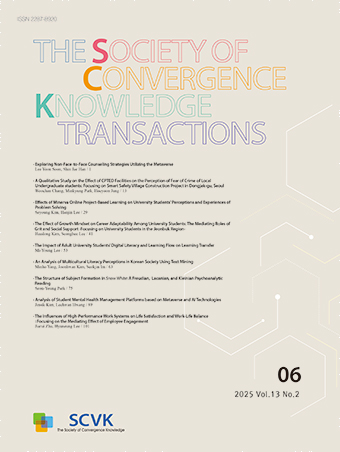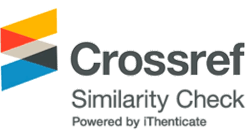Research Article
Abstract
References
Information
본 연구에서는 학교 밖 청소년의 사회적 낙인감과 스마트폰 중독의 관계에서 자아존중감과 우울의 연속다중매개효과를 살펴보았다. 이를 위해 한국청소년정책연구원에서 제공하는 ‘학업중단청소년패널조사’ 2차년도 조사(2014)의 청소년 데이터를 활용하여 분석하였다. 연구결과, 첫째, 사회적 낙인감은 스마트폰 중독에 정적으로 유의한 영향을 미치는 것으로 나타났다. 둘째, 사회적 낙인감과 스마트폰 중독의 관계를 자아존중감이 매개하지 않는 것으로 나타났다. 셋째, 사회적 낙인감과 스마트폰 중독의 관계를 우울이 매개하는 것으로 나타났다. 넷째, 사회적 낙인감과 스마트폰 중독의 관계를 자아존중감과 우울이 연속적으로 다중매개하는 것으로 나타났다. 본 연구결과를 토대로 하여 학교 밖 청소년의 스마트폰 중독의 대처와 예방에 있어서 사회적 낙인감, 자아존중감, 우울 등에 대한 사회적 대책을 모색하고 논의하였다. 또한 본 연구결과가 가진 함의 및 한계점을 살펴보고, 후속연구에 대해 제언하였다.
This study examined the mediating effects of self-esteem and depression on the relationship between social stigma and smartphone addiction of out-of-school adolescents. To this end, we analyzed adolescents data from the second year (2014) of the ‘Drop out Youth Panel Survey’ provided by the National Youth Policy Institute. As a result of the study, first, social stigma was found to have a significant and positive effect on smartphone addiction. Second, it was found that self-esteem did not mediate the relationship between social stigma and smartphone addiction. Third, it was found that depression mediates the relationship between social stigma and smartphone addiction. Fourth, it was found that self-esteem and depression sequentially multiple mediate the relationship between social stigma and smartphone addiction. Based on the results of this study, social countermeasures for social stigma, self-esteem, and depression were sought and discussed in coping and prevention of smartphone addiction of out-of-school adolescents. In addition, the implications and limitations of the results of this study were reviewed, and research that needs to be followed was suggested.
- 이동한, 이환배, 김대진, 이상규, "청소년 인터넷 및 스마트폰 중독 경향성과 성격 특성", 중독정신의학, 제19권 제2호, pp.82-89, 2015.
- M. D. Griffiths, "Internet Addiction: Fact of Fiction?", The Psychologist, Vol. 12, No. 5, pp. 246-250, May 1999.
- 최홍일, 정윤미, "학교 밖 청소년이 체감하는 사회적 낙인감이 스마트폰 중독에 미치는 영향에 있어서 우울의 매개효과 검증 -성별 차이를 중심으로-", 한국아동복지학, 제69권 제4호, pp.31-58, 2020.https://doi.org/10.24300/jkscw.2020.12.69.4.31
- M. W. Bowen, and M. H. Firestone, "Pathological Use of Electronic Media: Case Studies and Commentary", Psychiatric Quarterly, Vol. 82, pp. 229-238, September 2011.https://doi.org/10.1007/s11126-010-9163-xPMid:21042855
- 이상준, "청소년의 스마트폰 중독 및 스마트폰 게임중독에 따른 보호요인과 위험요인의 비교 연구", 청소년복지연구, 제17권 제2호, pp.55-79, 2015.
- 과학기술정보통신부, 한국지능정보사회진흥원, "2020 스마트폰 과의존 실태조사", 2020.
- 김희민, 신성희, "남녀 중학생의 스마트폰 중독에 영향을 미치는 요인 비교", 정신간호학회지, 제24권 제3호, 145-155, 2015.
- S. Thomée, A. Härenstam, and M. Hagberg, "Mobile Phone Use and Stress, Sleep Disturbances, and Symptoms of Depression among Young Adults a Prospective Cohort Study", BMC Public Health, No. 11, p. 66, January 2011.https://doi.org/10.1186/1471-2458-11-66PMid:21281471 PMCid:PMC3042390
- B. M. Casey, "Linking Psychological Attributes to Smart Phone Addiction, Face-to-Face Communication, Present Absence and Social Capital", Masters Thesis, The Chinese University of Hong Kong, Hong Kong, China, 2012.
- 이상준, "스마트폰 중독 청소년의 정신건강 분석", 청소년복지연구, 제20권 제3호, pp.47-67, 2018.https://doi.org/10.19034/KAYW.2018.20.3.03
- 김정화, 조춘범, "청소년의 학교부적응이 스마트폰 중독에 미치는 영향: 우울의 매개효과 검증", 복지상담교육연구, 제6권 제2호, pp.381-403, 2017.
- 이신애, 조명선, "학교 밖 청소년의 스마트폰 과의존에 미치는 영향요인", 한국학교 ‧ 지역보건교육학회지, 제20권 제3호, pp.15-27, 2019.https://doi.org/10.35133/kssche.20191231.02
- 이화명, 김영미, "학교 밖 청소년의 사회적 낙인과 심리사회적 적응 간의 관계: 자기개념 명확성의 조절효과", 한국콘텐츠학회 논문지, 제17권 제9호, pp.549-562, 2017.
- B. G. Link, and J. C. Phelan, "Conceptualizing Stigma", Annual Review of Sociology, No. 27, pp. 363-385, August 2001.https://doi.org/10.1146/annurev.soc.27.1.363
- 김영희, 최보영, "학업중단 청소년의 심리사회적 적응과정", 한국청소년연구, 제26권 제2호, pp.145-175, 2015.https://doi.org/10.14816/sky.2015.26.2.145
- 이지연, 조아미, "학교 밖 청소년의 낙인 경험에 대한 현상학적 연구", 청소년복지연구, 제23권 제1호, pp.55-82, 2021.https://doi.org/10.19034/KAYW.2021.23.1.03
- 박지원, 문성호, "학교 밖 청소년의 사회적 낙인이 자아존중감을 매개로 진로장벽에 미치는 영향", 부모애착의 조절된 매개효과, 제63호, pp.5-30, 2020.https://doi.org/10.17854/ffyc.2020.07.63.5
- 한상규, "청소년의 스마트폰 중독과정에 관한 현상학적 연구", 상담심리교육복지, 제6권 제1호, pp.7-22, 2019.
- 고은정, 김병년, "학교 밖 청소년의 사회적 낙인감이 스마트폰 중독에 미치는 영향: 자아존중감의 매개효과", 청소년학연구, 제27권 제12호, pp.105-131, 2020.https://doi.org/10.21509/KJYS.2020.12.27.12.105
- 고은정, 김병년, "학교 밖 청소년의 사회적 낙인감이 스마트폰 중독에 미치는 영향: 진로장애의 매개효과를 중심으로", 한국청소년연구, 제31권 제4호, pp.33-63, 2020.https://doi.org/10.14816/sky.2020.31.4.33
- 김병년, 김상용, "학교 밖 청소년의 사회적 낙인감이 스마트폰 중독에 미치는 영향과 충동성의 매개효과에 관한 연구", 인문사회21, 제11권 제6호, pp.3397-3410, 2020.https://doi.org/10.22143/HSS21.11.6.238
- 박주영, 우정희, "학교 밖 청소년들의 사회적 낙인감과 우울의 관계에서 자아존중감과 자아탄력성의 매개효과", 한국학교보건학회지, 제33권 제2호, pp.97-105, 2020.
- 양은륜, 정문경, "학업중단 청소년의 사회적 낙인감이 스마트폰 중독에 미치는 영향에서 우울의 매개효과", 인문사회21, 제11권 제6호, pp.1781-1796, 2020.https://doi.org/10.22143/HSS21.11.6.126
- 양경미, "대학생의 자아존중감, 우울이 스마트폰 중독에 미치는 영향", 한국융합학회논문지, 제7권 제1호, pp.113-123, 2016.https://doi.org/10.15207/JKCS.2016.7.1.113
- T. W. Smith, and J. Grenberg, "Depression and Self-Focused Attention", Motivation and Emotion, Vol. 5, No. 4, pp. 323-331, December 1981.https://doi.org/10.1007/BF00992551
- M. H. Kernis, B. D. Grannemann, and L. C. Mathis, "Stability of Self-Esteem as a Moderator of the Relation between Level of Self-Esteem and Depression", Journal of Personality and Social Psychology, Vol. 61, No. 1, pp. 80-84, July 1991.https://doi.org/10.1037/0022-3514.61.1.80PMid:1890590
- 김경호, "청소년의 자아존중감과 우울 간의 관계: 한국아동 ‧ 청소년패널조사의 3개 시점의 비교", 청소년복지연구, 제21권 제2호, pp.69-96, 2019.https://doi.org/10.19034/KAYW.2019.21.2.03
- 박동진, 김송미, "다문화 청소년의 이중문화 수용태도가 삶의 만족도에 미치는 영향: 자아존중감과 우울의 순차적 매개효과", 한국웰니스학회지, 제16권 제2호, pp.267-273, 2021.https://doi.org/10.21097/ksw.2021.05.16.2.267
- 박동진, 김나연, "학교 밖 청소년의 사회적 낙인감이 우울에 미치는 영향에서 자아존중감의 매개효과", 한국청소년활동연구, 제5권 제3호, pp.71-87, 2019.https://doi.org/10.36697/skya.2019.5.3.71
- 윤철경, 서정아, 유성렬, 조아미, "학업중단 청소년 패널조사 및 지원방안 연구 Ⅱ(연구보고 14-R19)", 한국청소년정책연구원, 2014.
- 배주미, 정익중, 김범구, 김영화, "취약청소년 자립지원 모형 개발", 한국청소년상담원, 2010.
- 이창호, 성윤숙, 정낙원, "청소년 소셜미디어 이용 실태조사", 한국청소년정책연구원, 2012.
- 최인재, 모상현, 이선영, "청소년 정신건강 증진을 위한 지원방안 연구 Ⅱ(연구보고 12-R15)", 한국청소년정책연구원, 2012.
- 이경상, 백혜정, 이종원, 김지영, "한국아동 ‧ 청소년패널조사 2010 Ⅱ 사업보고서(연구보고 11-R10)", 한국청소년정책연구원, 2011.
- A. F. Hayes, "Introduction to Mediation, Moderation, and Conditional Process Analysis: A Regression-Based Approach", Guilford Press, 2013.
- R. B. Kline, "Principles and Practice of Structural Equation Modeling (4th Ed.)", Guilford Press, 2015.
- P. E. Shrout, and N. Bolger, "Mediation in Experimental and Nonexperimental Studies: New Procedures and Recommendations", Psychological Methods, Vol. 7, No. 4, pp. 422-445, December 2002.https://doi.org/10.1037/1082-989X.7.4.422PMid:12530702
- Publisher :The Society of Convergence Knowledge
- Publisher(Ko) :융복합지식학회
- Journal Title :The Society of Convergence Knowledge Transactions
- Journal Title(Ko) :융복합지식학회논문지
- Volume : 9
- No :3
- Pages :115-125
- DOI :https://doi.org/10.22716/sckt.2021.9.3.034




 The Society of Convergence Knowledge Transactions
The Society of Convergence Knowledge Transactions







